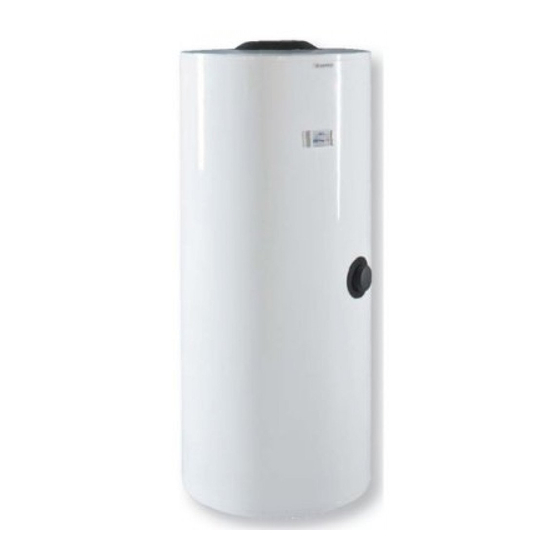Drazice OKC 200 NTRR/SOL Manuel d'utilisation et d'installation - Page 13
Parcourez en ligne ou téléchargez le pdf Manuel d'utilisation et d'installation pour {nom_de_la_catégorie} Drazice OKC 200 NTRR/SOL. Drazice OKC 200 NTRR/SOL 17 pages. For solar systems
Également pour Drazice OKC 200 NTRR/SOL : Manuel d'utilisation et d'installation (12 pages)

2.4 FIRST COMMISSIONING
PROCEDURE OF FILLING THE TANK WITH WATER
1. Open the stop valve on the tank inlet
2. Open the hot water valve on the combination faucet. Once water starts flowing out through the
combination faucet the filling is completed and the faucet shuts off.
3. Check the joints for tightness.
4. When start using, keep flushing the tank until the cloud disappears.
5. Make sure to fill in properly the warranty certificate.
2.5 INSPECTION, MAINTENANCE & CARE FOR THE APPLIANCE
If water contains too many minerals, an expert has to come to remove the scale that forms
inside the tank, as well as free sediments. This has to be performed after one or two years
of operation. The cleaning is carried out through the hole in the flange – dismantle the flange
lid and clean the tank. A new sealing has to be used for re-fitting. Since the inside of the tank
has special enamel, which must not get in contact with the scale removing agent – do not work
with decalcification pump. Remove the lime layer with a timber and suck it off, or wipe it off
with a clout. After that, the appliance must be rinsed thoroughly and the heating process is
checked the same as during the initial putting in operation. Do not use any abrasive cleaning
agents (such as liquid sand, chemicals - acid, alkaline) or dye thinners (such as cellulose thinner,
trichlor, and the like) to clean the outer shell of the tank. For cleaning use a wet clout and add
a few drops of liquid cleaning agent for household applications. Repetitive water heating
causes lime scale sediment on both the tank walls and chiefly on the flange lid. The
sedimentation depends on the hardness of heated water, its temperature, and the amount of
hot water consumed.
We recommend checking and cleaning the tank from scale and eventual replacement
of the anode rod after two years of operation. The anode life is theoretically calculated
for two years of operation; however, it changes with water hardness and chemical composition
in the place of use. Based on such an inspection, the next term of anode rod exchange may be
determined. If the anode is only blocked with sediments clean its surface and, if used up, mount
a new one. Have a company in charge of service affairs deal with the cleaning and exchanging
of the anode. When draining water from the tank, the mixing faucet valve for hot water must
be open, preventing the occurrence of under-pressure in the tank receptacle that would stop
water from draining.
PROCEDURE OF EXCHANGING ANODE ROD IN UPPER PART OF THE TANK
1.
Turn off control voltage to the tank
2. Drain water from 1/5 tank.
PROCEDURE: Close water inlet in the tank
Open the hot water valve on the combination faucet
Open the drain tap of the tank
3. Anode is screwed in under the plastic cover in the upper lid of the tank
4. Unscrew the anode using adequate wrench
5. Pull the anode out and follow reversed steps to install a new one
6. During the fitting, make sure the grounding cable (300-500l) is connected properly; this is the
condition of the anode's proper functioning
7. Fill the tank with water
- 13 -
